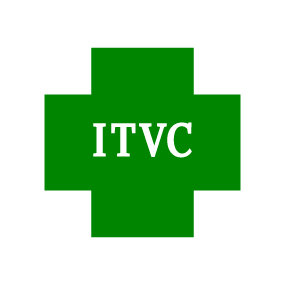The best approach to Malaria prevention is based on two defenses:
- Oral Prophylaxis Medication
- OR personal protection against malaria.
Because Malaria is wide spread and may be chloroquine resistant it is best to consult an ITVC doctor who may advise you of the most beneficial treatment on an individual basis depending on the duration of travel
Malaria Information
Malaria transmitted by infected Anopheles mosquito bites
Infection with malaria parasites may result in a wide variety of symptoms, ranging from absent or very mild symptoms to severe disease and even death. Malaria disease can be categorized as
In general, malaria is a curable disease if diagnosed and treated promptly and correctly.
Incubation Period
Following the infective bite by the Anopheles mosquito a period of time (the "incubation period") goes by before the first symptoms appear. The incubation period in most cases varies from 7 to 30 days. The shorter periods are observed most frequently with P. falciparum and the longer ones with P. malariae.
Antimalarial drugs taken for prophylaxis by travelers can delay the appearance of malaria symptoms by weeks or months, long after the traveler has left the malaria-endemic area. (This can happen particularly with P. vivax and P. ovale, both of which can produce dormant liver stage parasites; the liver stages may reactivate and cause disease months after the infective mosquito bite.)
Such long delays between exposure and development of symptoms can result in misdiagnosis or delayed diagnosis because of reduced clinical suspicion by the health-care provider. Returned travelers should always remind their health-care providers of any travel in areas where malaria occurs during the past 12 months.
Symptoms
All the clinical symptoms associated with malaria are caused by the asexual erythrocytic or blood stage parasites. When the parasite develops in the erythrocyte, numerous known and unknown waste substances such as hemozoin pigment and other toxic factors accumulate in the infected red blood cell. These are dumped into the bloodstream when the infected cells lyse and release invasive merozoites. The hemozoin and other toxic factors such as glucose phosphate isomerase (GPI) stimulate macrophages and other cells to produce cytokines and other soluble factors which act to produce fever and rigors and probably influence other severe pathophysiology associated with malaria.
Plasmodium falciparum-infected erythrocytes, particularly those with mature trophozoites, adhere to the vascular endothelium of venular blood vessel walls and do not freely circulate in the blood. When this sequestration of infected erythrocytes occurs in the vessels of the brain it is believed to be a factor in causing the severe disease syndrome known as cerebral malaria, which is associated with high mortality.
Uncomplicated Malaria
The classical (but rarely observed) malaria attack lasts 6-10 hours. It consists of
- a cold stage (sensation of cold, shivering)
- a hot stage (fever, headaches, vomiting; seizures in young children)
- and finally a sweating stage (sweats, return to normal temperature, tiredness).
Classically (but infrequently observed) the attacks occur every second day with the "tertian" parasites (P. falciparum, P. vivax, and P. ovale) and every third day with the "quartan" parasite (P. malariae).
- More commonly, the patient presents with a combination of the following symptoms:
- Fever chills, sweats, Headaches, Nausea and vomiting, Body aches and General malaise
- In countries where cases of malaria are infrequent, these symptoms may be attributed as influenza, a cold, or other common infections, especially if malaria is not suspected.
- Physical findings may include:
- Elevated temperatures Perspiration Weakness enlarged spleen mild jaundice enlargement of the liver Increased respiratory rate
- Diagnosis of malaria depends on the demonstration of parasites in the blood, usually by microscopy. Additional laboratory findings may include mild anemia, mild decrease in blood platelets (thrombocytopenia), elevation of bilirubin, and elevation of aminotransferases.
- Severe Malaria
- Severe malaria occurs when infections are complicated by serious organ failures or abnormalities in the patient's blood or metabolism. The manifestations of severe malaria include
- Cerebral malaria, with abnormal behavior, impairment of consciousness, seizures, coma, or other neurologic abnormalities
- Severe anemia due to hemolysis (destruction of the red blood cells)
- Hemoglobinuria (hemoglobin in the urine) due to hemolysis
- Acute respiratory distress syndrome (ARDS), an inflammatory reaction in the lungs that inhibits oxygen exchange, which may occur even after the parasite counts have decreased in response to treatment
- Abnormalities in blood coagulation
- Low blood pressure caused by cardiovascular collapse
- Acute kidney failure
- Hyperparasitemia, where more than 5% of the red blood cells are infected by malaria parasites
- Metabolic acidosis (excessive acidity in the blood and tissue fluids), often in association with hypoglycemia
- Hypoglycemia (low blood glucose). Hypoglycemia may also occur in pregnant women with uncomplicated malaria, or after treatment with quinine.
Severe malaria is a medical emergency and should be treated urgently and aggressively.
Malaria Relapses
In P. vivax and P. ovale infections, patients having recovered from the first episode of illness may suffer several additional attacks


